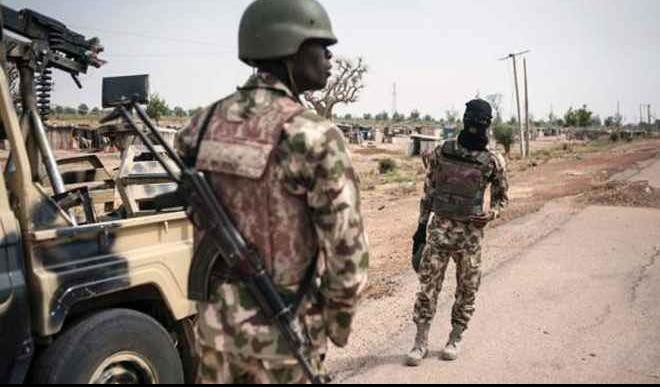B/Haram: We didn’t force suspects to drink urine – Army
The Nigerian Army yesterday said it did not force 486 Boko Haram suspects arrested on their way from Jigawa to Port Harcourt on June 15, 2014, in 33 buses to drink urine. A Controller of the Nigerian Army Operation Centre, North East, Maj. Chudi Aniukwu, said this in his testimony before the presidential investigation panel […]

Nigerian troops

The Nigerian Army yesterday said it did not force 486 Boko Haram suspects arrested on their way from Jigawa to Port Harcourt on June 15, 2014, in 33 buses to drink urine.
A Controller of the Nigerian Army Operation Centre, North East, Maj. Chudi Aniukwu, said this in his testimony before the presidential investigation panel on human right violations in Abuja.
He said contrary to media reports the suspects ate same food with the soldiers and were kept for seven days for proper profiling by the Department of State Services (DSS).
He said only one out of the 486 suspects was identified by the DSS as a Boko Haram suspect.
He said he got a call at around 3a.m. on June 15, 2014 that the Army in Port Harcourt had intercepted Boko Haram suspects who were crossing over to other parts of Nigeria, especially the Niger Delta.
He said the suspects were moved to Abia headquarters of the Army base, and the information was routed to the highest authority in the Army and the DSS.
Aniukwu said what aroused suspicion was the huge number of movement at a go and the volatile security situation in the country at the time.
He said after the investigation by the DSS, the driver of each vehicle was given N22,000 to enable them return to their destinations.
However, one of the drivers of the vehicles, Suleiman Adamu, in his testimony, said the passengers were going to Port Harcourt for greener pastures. He added that they were held in custody for 12 days contrary to the Army’s claim that they were held only for seven days.
The chairman of the seven-man panel, Justice Biobele A. Georgewill discharged the witnesses and said their complaints would be looked into and recommendations submitted to President Muhammadu Buhari for necessary actions.
The panel has since ended its sittings which took it to each of the six geo-political zones and twice in Abuja. It heard among others in Abuja, petitions from Moon Valley community of Benue State, Amnesty International, against the Nigerian Army.
It also heard a memorandum submitted by Falana on the military justice system which called for the reform of the Armed Forces Act (AFA).
